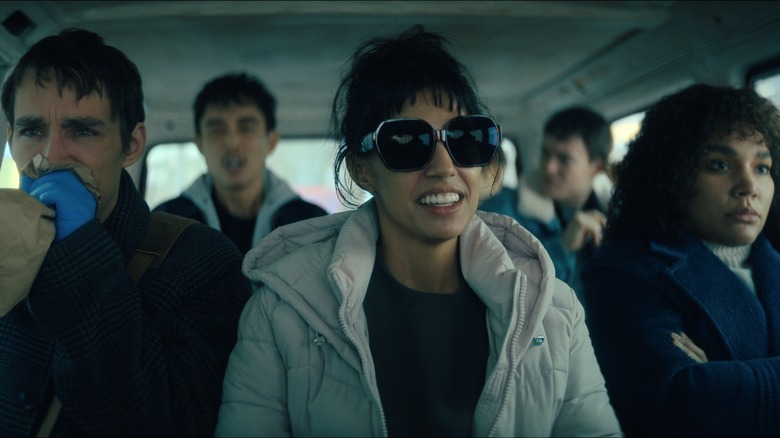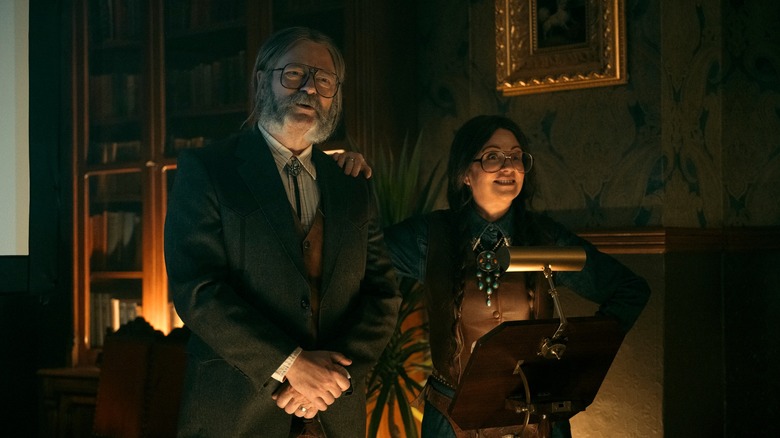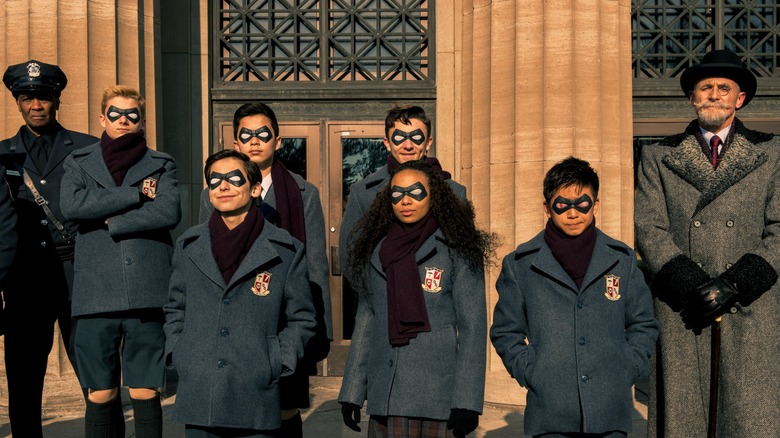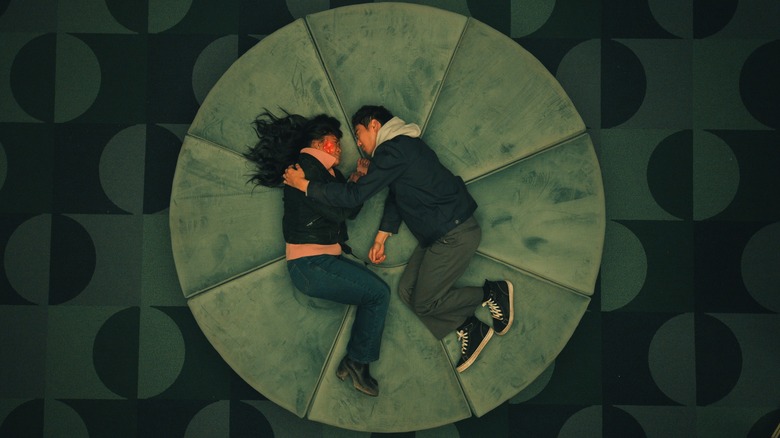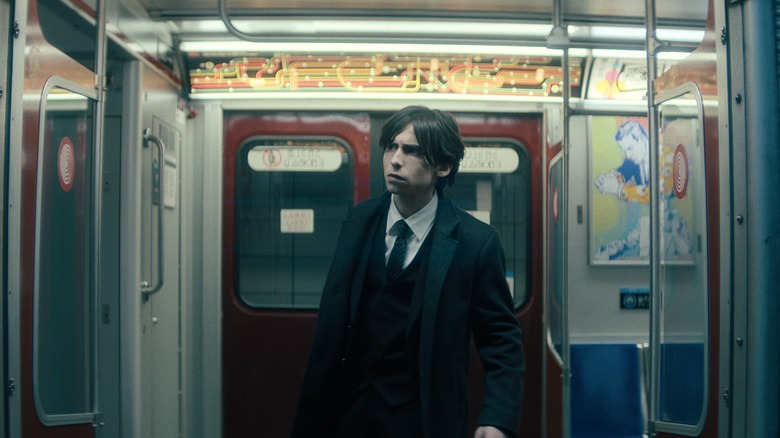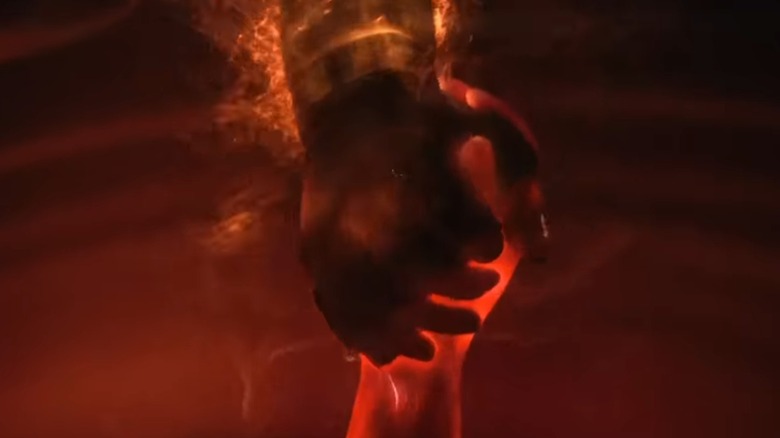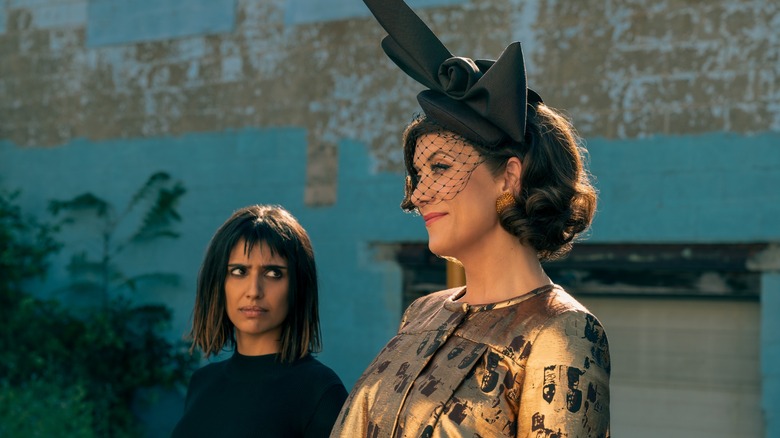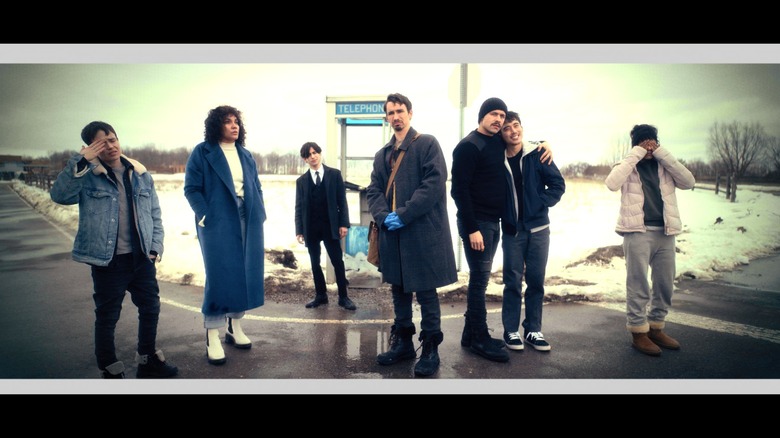Umbrella Academy Season 4 Ending Explained: Marigold, The Cleanse, And A Diner Outside Of Time
This post contains detailed spoilers for the final season of "The Umbrella Academy."
"The Umbrella Academy" is over, and the Netflix sci-fi series managed to take down countless timelines and a whole family of superheroes with it. The show ended this week with a six-episode arc that messily, confusingly, and –- somehow –- satisfyingly closed the book on the story of the Hargreeves family once and for all. Along the way, unlikely pairings fell in love, long-suffering characters were redeemed, and Nick Offerman and Megan Mullally did a funky little dance.
But what does it all mean? Try to explain the emotional conclusion to "The Umbrella Academy" and you'll find yourself in need of a whiteboard to chart out the show's many alternate universe offshoots and vague scientific theories. As heartfelt as the end of the show is, it's not exactly logically airtight, and since season 4 has outpaced Gerard Way's comic books, which previously served as inspiration for the show, there's no text to cross-reference for clarity here. But there are plenty of details dropped throughout these episodes –- and in previous seasons –- to help make sense of the newly reset timeline and its important place in the show's multiverse.
Marigold, durango, and The Keepers explained
To understand what the hell happened in the "Umbrella Academy" series finale, it's worth revisiting an element that's been mentioned in past seasons of the show: marigold. Before season 4, audiences had already seen the gold stuff before, as the original papa Hargreeves (Colm Feore) released some of it into the atmosphere when his wife was dying back in season 1. That was sometime after 1898 (possibly on a planet other than Earth), and the particles eventually led to the creation of the superpowered kids he'd ultimately collect.
The "reset" iteration of the Umbrella Academy that we meet at the beginning of season 4 has no powers, but they soon find a jar of marigold that The Keepers uncovered. The Keepers are militant conspiracy theorists who (rightfully) believe this dimension is not the "true" timeline, and that an event called The Cleanse will return everything to normal. Ben (Justin H. Min), who's alive and a jerk in this timeline, doses a round of shots with the marigold, and sober Klaus (Robert Sheehan) gets an infusion of it when he dies a bit later on. Thus, all the Umbrella kids are back to their super-powered selves and then some.
The marigold alone isn't the reason for this season's apocalypse, but as mama Hargreeves (Liisa Repo-Martell) eventually explains, it can become a catalyst capable of nuclear-level destruction if it comes into contact with a second artificially synthesized element, durango. "Years ago, I synthesized a new element, the very essence of the universe," she tells the kids, referencing marigold. "And at the same moment, unbeknownst to me, a second particle was created." We don't really know who made durango (maybe it was another version of Abigail, or maybe it was meant to be revealed in the show's reportedly canceled spinoff), but we know who ended up made of it: Jennifer (Victoria Sawal).
The truth about The Jennifer Incident
The show's fourth season ties the durango plot into the overarching timeline by finally revisiting the incident in 2006 that killed a young Ben. Since the show's beginning, Ben's death has loomed large over the Hargreeves siblings, especially since Reginald seemed to blame it on the kids' inability to work together. That clearly wasn't true: It turns out Reginald wiped their memories of the incident, and when he and Abigail put them back, they show a much different, even darker scenario.
The Jennifer Incident, as it was eventually called, happened when the teen heroes were tasked with intercepting the transport of what they're told is a dangerous new weapon acquired by a Moldovan arms dealer. Hargreeves warns the kids not to look at the package under any circumstances, but when they arrive on site, Ben hears a distinctly human sound coming from within. He opens the box to discover a girl, Jennifer, who viewers already know was discovered inside a giant squid caught by fisherman. Ben rescues Jenn (side note: I can't believe no one in the show called them Bennifer), but both of them are immediately shot at point blank range by Hargreeves.
The rest of the kids are understandably traumatized, but Hargreeves thinks he's actually saving the world. Again, like the Keepers, he's probably right: Jennifer was born with durango inside of her, and Ben had marigold in his veins. As we've seen in the present-day timeline, just one touch between the two of them can set off a chain reaction to end the universe. And despite Hargreeves' extreme measures, that's exactly what ends up happening.
The tragedy of Ben and Jennifer
Ben meets Jennifer in the diner she owns, and is under the assumption that she's the missing daughter of a mysterious man named Sy (David Cross). In reality, she's the key to figuring out why the current timeline feels "off," and as such, is a precious target for the Keepers. The pair are quickly attracted to each other –- Ben theorizes that they're from the same place since they both have giant squid-related backstories, possibly a nod to the comic books' planet Rigel X-9 –- and while on the run from the Keepers, they end up hooking up.
This is a distinctly bad idea. Their close proximity leads both of them to develop a superpowered rash of sorts, which, when untreated, eventually turns them into Cronenberg-esque goopy monsters. The pair go full "The Fly" and continue to grow, eventually turning into a sort of two-faced kaiju that is on track to destroy the world in the show's finale. The Cleanse is real, and they've caused it, with some help from a guilt-stricken Abigail, who helped move things along with her own superpowers. It's all because Ben and Jennifer decided to be together, but the pair don't seem to regret it: Two people who always felt alone finally got the feeling of "family" they'd been missing, even if it didn't last.
There are, of course, some plot holes here. Why couldn't Viktor (Elliot Page) take the marigold out of Ben when he'd done something similar before? Why couldn't the Umbrella Academy travel back to the day before their inception, gather up their moms, and then have Viktor take the marigold from them at the moment they became pregnant? With an extra-short season to conclude this story, the show doesn't seem to have enough time to consider all of this, but it seems likely that one of the many Fives at the multidimensional diner did.
Five and the end of the world diner
This brings us to another short, complex scene that's essential to understanding the show's endgame. In the series' final episode, Five (Aidan Gallagher) leaves the group after Lila (Ritu Arya) seems to rebuff him. He ends up on the time travel subway once again, and it takes him to a surprising destination: a diner that's completely full of alternate timeline Fives. As one of them explains, they've all pretty much retired to this weird limbo space after failing to figure out how to save their worlds.
It turns out that the Umbrella Academy's penchant for ending the world isn't just a redundant decision from the show's writers' room. It's actually an inevitability that was apparently triggered by the kids' marigold-infused inception, which shattered the one "true" timeline into thousands of them. In each one, the Hargreeves end the world one way or another. The show doesn't get into the "whys" of this much, but it seems likely that having human beings walking around with what's basically a god particle inside of them is too much for the fabric of the space-time continuum to handle.
Basically, string theory only exists here because of the Hargreeves, and it's an unstable system that's doomed to destroy itself again and again. Despite their collective genius, none of the Fives has ever figured out how to undo it and set the world right, and the world has ended roughly 150,000 times. But our Five is different, and so are our Hargreeves: Everything they've been through has brought them to this moment, in which they're asked to sacrifice themselves and actually choose to do it despite their fear and selfishness.
The end of the Umbrella Academy
The plan is surprisingly simple. Basically, the Umbrella Academy has to stop existing, something they can apparently do by letting the durango-marigold hybrid monster consume them while their powers are active. No one really explains why this is the way to remove them from the timeline, but it's a noble and surprisingly emotional choice nonetheless. The group isn't into it until they realize that it might be possible for their families to carry on without them in the "perfect" timeline.
This, too, doesn't make a ton of sense, as time travel movies like "Back to the Future" have taught us that if we stop existing, our descendants will also vanish. But Way's books have always cared more about emotional and aesthetic truth than logic, and this ending is in line with that ethos –- even if its philosophy is more hopeless than expected. There's something painful about the idea of a world that can only be saved by the complete erasure of people who fought so hard to be here, and of Five's absolute certainty that those people are the problem. Upsettingly, this conclusion imagines a sort of fairy tale suicide story, in which those left behind aren't traumatized because they never knew their loved one existed in the first place.
Dark as it is, "Umbrella Academy" makes this feel like a happy ending, too. The Hargreeves siblings -– including Lila –- allow themselves to be swallowed up whole by the universe-eating goo, joking with each other about how they're total a**holes up to the very last second. Then they're gone.
A picnic in the perfect timeline
Five's gambit worked. Before the Hargreeves vanished, Lila led their families to the subway station –- and, I imagine, gave someone instructions to the ideal timeline on the way. The group knew this plan would work because Ben shared a flash of it with Viktor as he was dying: an image of people picnicking in the park. We see them in the show's final scene. There are Umbrella family members there, like Diego and Lila's kids and Claire, but there are also several characters who died as a result of the Academy in previous seasons.
We see Kate Walsh's The Handler take a phone call on a bench, The Swedes from season 2 play frisbee in matching track outfits, and Agnes (Sheila McCarthy), the baker Hazel fell for who ultimately died from cancer, on a bike ride with a man who I assume is Hazel. This is a bit like the afterlife scene in "Lost," except instead of our main characters reuniting, it's nearly every side character who ended up collateral damage throughout the show's four seasons. There's also no big epiphany moment here; the inhabitants of the true timeline are blissfully happy and wholly unaware of any other version of reality.
The long-absent narrator ends the series with a statement that mirrors the way it began, flipping the strange births of the Hargreeves kids on their heads to instead deliver a bittersweet observation about the world without them. "On the 12th hour of the eighth day of August 2024, absolutely nothing out of the ordinary occurred," he says. "You might say it was just a normal day." You might, except we're all crying!
About that post-credits scene
The end of "The Umbrella Academy" –- both the show and the organization –- is tricky, and not just because of all the complex timey-wimey stuff that leads to it. By retconning our heroes into a problem that can only be solved by their own undoing, the show is at once hopeful and hopeless, dark as hell and carried through by the strength of its own surprising conviction. Stronger writing in its final episode could've sold the self-sacrifice concept a bit better, or at least tied it in more firmly to the characters' inconsistent heroes' journeys. Yet despite all that, "Umbrella Academy" pulls off something singular here –- and pulls the show out of the nosedive that was the awful third season.
Whether the "true timeline" ending resonates with you or not, the team behind the show makes sure not to end it on too downbeat a note. Two excellent needle drops grace these last scenes, and the episode's end credits are chock full of adorable behind-the-scenes photos. These pictures of happy castmates and crew members (a sharp contrast to the allegedly vindictive writers' room described by a recent Rolling Stone report) keep fans watching through to a post-credits scene.
It's a simple scene that can almost certainly be taken at face value. In it, the camera lingers once again on a tree in the park of the true timeline before panning down to reveal eight golden flowers sprouting together from the ground. They're marigolds that shine with a fantastical sparkle, and there's one for each of the people who sacrificed themselves to save the timeline: Luther, Diego, Allison, Klaus, Five, Ben, Viktor, and Jennifer. There's no sense of danger to the universe's equilibrium here, as the group isn't actually back, but it's a sweet image that lets us know they're not entirely gone, either. They're still in their loved ones' lives, not in human form, but as a flower, swaying in the breeze on a perfect summer's day.
